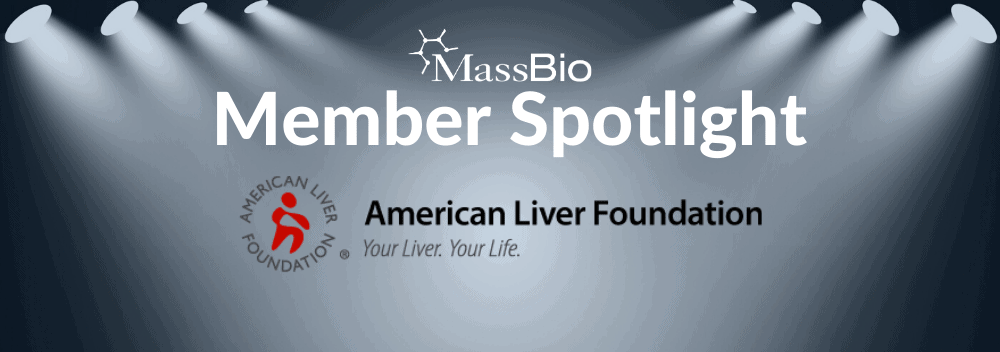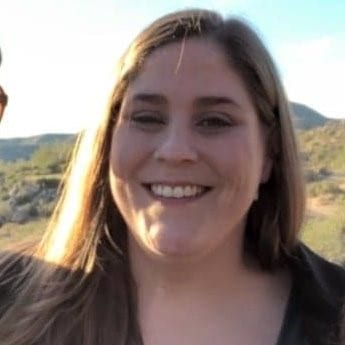
Every month, MassBio spotlights a member company and the great work they’re doing to advance the life sciences industry and support the patients we serve. In May, we spoke with Lindsay Ventura, Community Outreach and Education Manager for the American Liver Foundation New England Division. Lindsay is responsible for programmatic initiatives throughout New England (RI, MA, ME, NH, and VT) while also working with the National ALF Office to develop educational materials and programs. She began working at the American Liver Foundation in October 2014, 6 months after her mother received a liver transplant, and brings this personal experience and her previous professional experience in clinical settings to her work with the Foundation.
Tell us about your organization, its mission, and current initiatives

The American Liver Foundation (ALF) is the original national voluntary health organization devoted to combating liver disease and supporting people living with liver disease established in 1976. Our mission is to promote education, advocacy, and support services and research for the prevention, treatment, and cure of liver disease. Patients living with liver disease often experience extreme loneliness because of their condition and the social implications of liver disease. Individuals fear sharing their diagnosis as they are often met with misunderstanding and stigma. The ALF brings people living with these chronic conditions out of that loneliness, into an incredibly supportive community of patients, providers, staff members, and volunteers while ensuring equitable access to information from specialists through educational programming.
The ALF makes a measurable difference in the fight against liver disease by providing financial support for medical research, education for medical professionals, and advocacy and information for patients and their families, and by creating public awareness campaigns about liver wellness and disease prevention. The local New England Division has a very engaged community of liver patients, conducts free educational programs for patients, organizes patient-focused Continuing Medical Education programs for providers, advocates for local policy change, educates populations at high risk for liver disease, and brings together our local research community in an annual symposium focused on bridging basic science and liver disease.
How does your organization’s activities help patients now and into the future?
Currently, as the world is amid the COVID-19 pandemic, the ALF has drastically shifted our focus to address how the virus is impacting people with liver disease. Our patients are facing navigating their vulnerability to COVID-19 without their normal support structures in place: caregivers are without typical assistance of visiting nurses or regular doctors’ appointments; patients are being asked to physically distance from their support systems; families are facing unprecedented stress; everyone is trying to find a way to mentally manage these uncharted waters while remaining positive and productive. The ALF has been working diligently, coast to coast, to bolster our patient communities’ ability to respond to this pandemic and these unique stressors.
We have created a COVID-19 Resource Page to ensure people with liver disease have access to essential information to keep themselves well—mind, body, and spirit—and the tools to navigate their vulnerabilities. We are shifting programmatic offerings and special events, which usually bring our community together, onto virtual platforms. We are particularly excited about our Virtual Liver Life Walk Boston to engage the New England community remotely, allowing for social networks to persevere despite physical distancing requirements, and raising essential funds for the ALF to continue our work. Please consider creating a virtual walk team and help support our work!
What do you see as the biggest challenge facing the life sciences industry today?
In the last few years, a gradual shift has occurred in the life sciences industry as researchers are being required to bring the patient voice and experience into the forefront of their work. Through my work at the ALF, I have been approached by many life science companies looking to hear from patients so as to better understand the patient experience of illness and the acceptable level of risk and accompanying potential therapeutic benefits. This integration appears to be a challenge to many in the life sciences industry as they struggle to engage patients in study design and develop literature that is accessible to their patient population. As someone who works for a patient advocacy organization who is also a patient (I grew up with Hepatitis C which I contracted from my mother at birth) I am excited to see this challenge and eager to watch the life sciences industry rise to the occasion. It is a relief to see endpoints generated beyond the typical therapeutic focus, expanding to patient experience and quality of life.
What’s next for your organization / what are you focused on in the coming year?
Given the drastic upheaval we are facing as a result of COVID-19, it is hard to know for sure what is next for our organization or where we will be in a year. Right now, everyone is looking to rework plans and identify a new way of doing business. Our Boston Marathon® team, the Run for Research team, raises money for liver-related research and should have crossed the finish line on April 20th. They are continuing to train for the 2020 Marathon, now rescheduled to September. We are hopeful this fall will find our world a bit more normal and, perhaps, we can gather our community together for our culinary events, educational programs, and, of course, our Annual Irwin M. Arias Symposium: Bridging basic science and liver disease.
However, regardless of what the coming year looks like, the ALF will continue to promote education and information for people living with liver disease through virtual programming until it is safe to, once again, gather in person. We will continue to bring patients together, even if remotely, to be sure physical distancing does not mean social isolation. We will continue to identify legislative priorities and work towards meaningful policy change in the lives of our patient community. We will continue our fight against liver disease with an eye towards the day we can meet again.
If you’re interested in being featured in MassBio’s Member Spotlight, please see guidelines here.